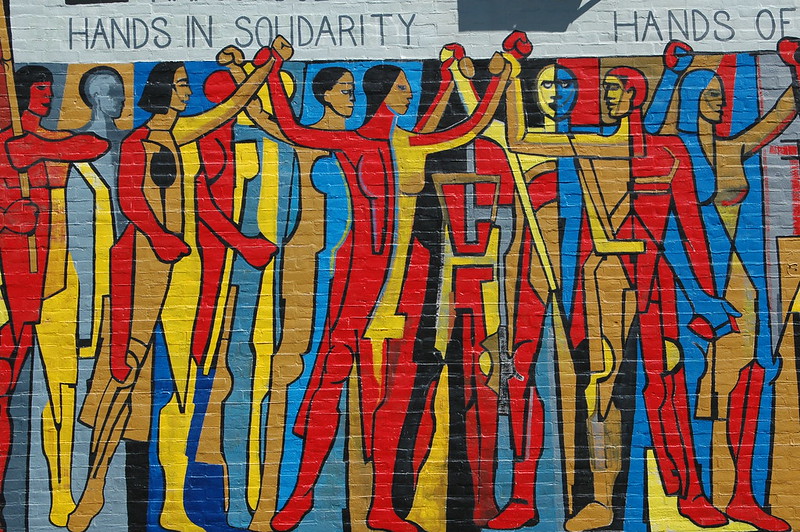Epilogue to “Solidarity in Apocalyptic Times”
by Bert Newton
I tell you, make friends for yourselves by means of dishonest wealth so that when it is gone, they may welcome you into the eternal homes.~ Luke 16:9, NRSV

I find this to be such a liberating statement by Jesus to those of us who find ourselves aware of the oppressive system that we depend on to survive but not able to extract ourselves from it. Jesus is telling us not to get stuck on trying to extract ourselves, trying to be morally or ethically pure. Purity is not the point, love is.
It doesn’t matter whether we are “prosperous” or not (that’s all relative anyway), even when we try to live simply, it is nearly impossible to buy food, clothes, or electronics that have not been produced by exploited labor. And any money that we use is part of a larger financial system that produces war machines and promotes overconsumption of the world’s resources.
It is all, as Jesus says, “dishonest wealth.”
But Jesus reminds us that purity is not the point; he even uses a parable about a “dishonest” manager to make this point. The Gospel does not call us to be morally pure, but rather to figure out, given the cards that we’ve been dealt, what to do now.
He says, “Use that dishonest wealth to make friends.”
Without context that simple command doesn’t sound like good moral advice, does it? Use money to make friends? Sounds like he’s telling us to buy our friends.
But he puts it that way to get our attention. Because what he means is that we need to let go of the idea that the wealth is honest, that it rightfully and honestly belongs to those who have it.
According to the parable, he is not just calling us to let go of our own wealth but also to be Robin Hoods, to “steal” from the wealthy and give to the poor.
Now, this teaching is largely hyperbolic; it is exaggeration to make a point. There is no evidence that Jesus and his disciples actually stole from the rich and gave to the poor.
But the point is that such activity, at least in principal, at least in theory, is morally justified because the whole system is horribly corrupt and depends on the exploitation of the working class. The wealth of the landowning class at that time, and the proverbial 1% now, was gained through dishonesty, a legal framework of thievery, and therefore does not, from any honest moral perspective, rightfully belong to those who have it.
So we should redistribute as much wealth as we are able so that we can build a network of friends who in return may help us out when we are in need. In other words, a network of mutual aid.
And he doesn’t merely call us to share this dishonest wealth with those who are already our friends, but rather to “make friends” with it.
Furthermore, the people that we are instructed to make friends with are those of the working class. In the parable, the manager, a middle class person, very quickly builds a relationship with working class peasants so that they will invite him into their homes.
Now, in my sermon, I ended by saying that we should be sharing our wealth now with those lower in the economic hierarchy so that when our wealth is gone, they might invite us into their “more enduring community.” You see what I did there? I substituted “more enduring community” for “the eternal homes.” Clever, huh?
You see, I’m not exactly sure what “the eternal homes” means. The manager is hoping to gain entrance into the homes of the peasants. Jesus then switches out those homes with the phrase “the eternal homes.” The Greek word for “eternal” is the word aiónios which can mean “long lasting” rather than actually “eternal.” So I figured that Jesus was not saying that the houses that the peasants lived in would last forever, but rather that their community of mutual aid was long lasting, or “more enduring.” Perhaps from a spiritual perspective, this community might even be eternal, the way that love is eternal, but on the ground, I think “more enduring” is the best bet.
In our own modern context, I think it is safer to say that we might be able to use our “dishonest wealth” to forge solidarity with the working class in our area who then might invite us into their community, but I doubt they would have the ability to ever invite us to live with them, although one never knows what might happen.
In the last couple of years Gloria and I and a small circle of friends, including Joe and Glory Bautista, have been using some of our dishonest wealth to make friends with the working-class immigrant community here in Pasadena. What we have discovered is that lack of housing is a major problem in that community. We frequently get calls asking us to help with housing. As a result, we not only have helped find housing for them or helped them with housing costs, but in a couple of cases we have invited them into our homes to live with us.
I sincerely doubt that if some of us became homeless that the working-class immigrant community in Pasadena would be able to invite us into their homes; they seem to be maxed out in their homes already. And I don’t know that in an economic collapse they would suddenly have greater capacity to help us out in this respect – although in an economic collapse, all bets are off, so….
But what I do know is that by building these relationships across class, ethnic, and linguistic barriers, we are better positioned to work together to build a more egalitarian society.
By building these relationships we can organize to redistribute power and resources in our society. United we are much stronger than we are when we are divided.
Already we have joined with them to successfully pass a minimum wage ordinance in Pasadena so that the minimum wage here is substantially higher than the state minimum wage. With greater solidarity and engagement, we could do a lot more.
So whether we suffer individual financial hardship, a moderate recession, or full economic collapse, our new friends will make us stronger. The old mammon economy will likely fail us one way or another. So Jesus calls us to build a new economy, a whole new society, one built on love through our new friends. This will be a more enduring community, better able to endure the shocks and hardship of Mammon collapse. And from a spiritual perspective, the love in these new relationships will be eternal.
More on Mutual Aid:
